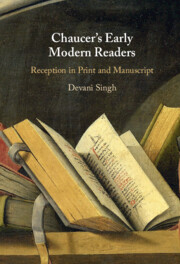‘Devani Singh reveals how extensively early modern readers engaged with Chaucer's works. This is an important contribution to debates about periodisation. Singh's elegant study underlines the importance of the manuscript book in the age of print, and will increase awareness of the continuities in literary consumption across the period 1400–1600.'
Margaret Connolly - University of St Andrews
‘Scrupulously substantiated and cross-referenced, this book brings to life an intriguing cast of Chaucer readers and the volumes they owned.’
Julia Boffey - The Times Literary Supplement
‘This is a valuable book, the product of an alert bibliographical intelligence linked to a keen sense of literary history. Dr. Singh demonstrates a firm grasp of the significance of the material forms and is able to convincingly interpret the evidence that they provide. All who are interested in the early reception of Chaucer will read this book to their profit.’
A. S. G. Edwards
Source: Journal of the Spanish Society for Medieval English Language and Literature
‘Devani Singh’s erudite and clearly written study of the reception of Geoffrey Chaucer’s medieval manuscripts in the centuries following his death is a welcome addition to scholarship on the complex, overlapping cultures of print and manuscript books that existed in early modern England. … A well written, cogently argued, and thought-provoking book, Chaucer’s Early Modern Readers will be essential reading for anyone interested in the history of the book, the reception history of Chaucer and of medieval manuscripts more broadly, early English canon formation, questions of periodization, and the intersection between manuscript and print culture in early modern England.’
Robert Stretter
Source: The Spenser Review
‘Chaucer’s Early Modern Readers is a thorough and insightful addition to our understanding of how Chaucer was read and indeed created in both early print and in manuscript. By foregrounding the manuscripts that circulated alongside early modern printed books, Singh refocuses scholarly attention, emphasizing the interaction between two media still often considered separately. Though the book focuses on Chaucer, scholars interested in the reception of medieval texts more broadly-the reception of Gower, Lydgate, Hoccleve, and others-will find much of interest in Singh’s compelling book, as will scholars thinking about periodization and materiality as it pertains to the medieval/early modern divide.’
Mimi Ensley
Source: Studies in the Age of Chaucer
‘This is a valuable book, the product of an alert bibliographical intelligence linked to a keen sense of literary history. Dr. Singh demonstrates a firm grasp of the significance of the material forms and is able to convincingly interpret the evidence that they provide. All who are interested in the early reception of Chaucer will read this book to their profit.’
A. S. G. Edwards
Source: Journal of the Spanish Society for Medieval English Language and Literature


